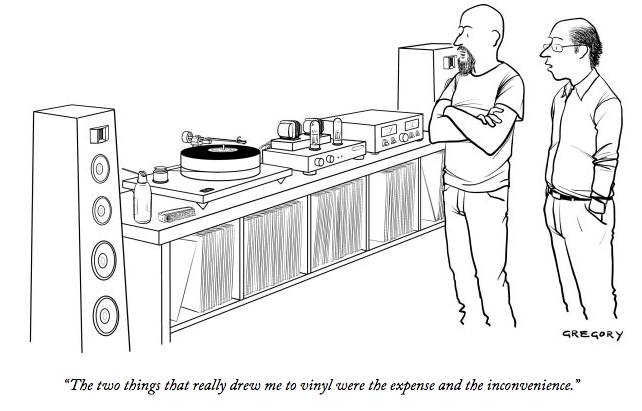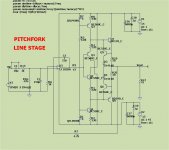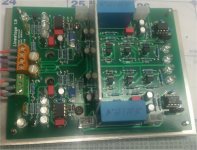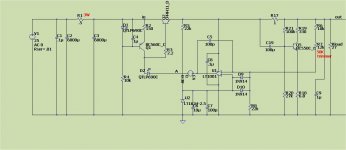htsware,
My point is just as you stated, you can have multiple amplifiers with extremely low measurable distortion numbers and they all sound different, the whole approach to designing each section along the chain in isolation is not working, it is a very flawed premise as far as I am concerned.
My point is just as you stated, you can have multiple amplifiers with extremely low measurable distortion numbers and they all sound different, the whole approach to designing each section along the chain in isolation is not working, it is a very flawed premise as far as I am concerned.
It is Dick Sequerra and his colleague, Mitch Cotter who both have very high credentials in the military-industrial, as well as the audio community, who keep me on track with what is wrong the negative feedback, open loop bandwidth, and many other esoteric questions. They would NOT (and Dick told me today to tell you so) agree with you on negative feedback and its problems.
'Stupidity' is in the opinion of the holder, in your case.
You're doing it again John! You can't be that dense, so you must be BS-ing us again. Sigh.
Ja
Yes, even if you have a really good professor (not too likely), a lot of the important things will just "go over your head"
in the classroom. Hands-on experience is key to one's depth of understanding.
Funny, I never had that in class. If I thought it was, I just kept on asking until I Got It. You mean you guys just accepted Not Getting It?
Jan
BTW I went into Glenn Kleinschmidts site a few days ago. He finished his distortion analyzer and is resolving down to about -121 dBV.
It this published somewhere -- a DIy or ?? Got schematics?
THx-RNMarsh
And so we come around full circle, instruments are there for checking out the relatively big mistakes we may have made, but the ultimate judge will be (or should be) one's own ears. What use is a perfectly measuring amp if it leaves you wanting?
It's here that my job is so much simpler than John's, Richard's, Demian's, etc - I have just one person to please, myself, and they need to please a lot of people. I do not envy them for it. And I pity those here who fail to understand that very basic fact that in the end, it's all about hearing. If they don't have it, they will forever make gear good for measuring but poor for listening to, except by a pure fluke.
Rayma's statement that even several amps from the same series sounded different says it all, and I believe Audio Research is a few cuts above Joe's Garage.
Just in case I might be misunderstood, I am saying instruments first, auditioning later, in that order, not bypassing any step.
On sims - I trust my sim a lot, not absolutely, but a lot (and it's not LT Spice). The raeson is simple - it has never deceived me. In fact, it works just as I like it, delivering rather conservative results. If it says something will do say 300 kHz, by the time it gets its own PCB, that will almost by default be 360 or so kHz. If it tells me that circuit will not oscillate, it will not oscillate. No exceptions, been like that since old versions from 2001.
It's here that my job is so much simpler than John's, Richard's, Demian's, etc - I have just one person to please, myself, and they need to please a lot of people. I do not envy them for it. And I pity those here who fail to understand that very basic fact that in the end, it's all about hearing. If they don't have it, they will forever make gear good for measuring but poor for listening to, except by a pure fluke.
Rayma's statement that even several amps from the same series sounded different says it all, and I believe Audio Research is a few cuts above Joe's Garage.
Just in case I might be misunderstood, I am saying instruments first, auditioning later, in that order, not bypassing any step.
On sims - I trust my sim a lot, not absolutely, but a lot (and it's not LT Spice). The raeson is simple - it has never deceived me. In fact, it works just as I like it, delivering rather conservative results. If it says something will do say 300 kHz, by the time it gets its own PCB, that will almost by default be 360 or so kHz. If it tells me that circuit will not oscillate, it will not oscillate. No exceptions, been like that since old versions from 2001.
I can't believe we are denigrating simulators here ! I suppose the computer is
also as useless. 😕
You can go from idea to simulation (below 1) , to CAD and product (below 2)
in weeks !
Nothing oscillated , all was spec to what the simulator predicted. Could not
measure any noise , perfect transient performance. Even the "hacked" Jung
regulators worked ( a bit more noise).
Audio was silent (noise). Nothing unexpected - followed the simulated
predictions exactly. DID NOT have to make more than one prototype ,
first try - close to perfect.
Same with the big power amps , never an oscillator. "Tweaks" can be
simulated and implemented.
DIY "heaven" - NO screwups !
OS
also as useless. 😕
You can go from idea to simulation (below 1) , to CAD and product (below 2)
in weeks !
Nothing oscillated , all was spec to what the simulator predicted. Could not
measure any noise , perfect transient performance. Even the "hacked" Jung
regulators worked ( a bit more noise).
Audio was silent (noise). Nothing unexpected - followed the simulated
predictions exactly. DID NOT have to make more than one prototype ,
first try - close to perfect.
Same with the big power amps , never an oscillator. "Tweaks" can be
simulated and implemented.
DIY "heaven" - NO screwups !
OS
Attachments
Why ?Nonsense John.
Some will never be a good audio designer if he is unable to design an amp with a paper and a pencil.
The final character of an amp depends a lot of the quality (character) of the components used, the physical implementation, and a lot of details (power supply diode noise filtering, AC leakage in trasfos etc...) that are not taken in consideration in simulators. Everything that come with experience and, yes, listening.
On the other side, simulators allow better optimization because we can see the result of any change in a snap, that would had took weeks with changing real parts, listening and measuring. And, as OS says, it is very helpful to predict the stability and performance of a design.
On my opinion, simulators are fantastic tools if you know how to interpret their results, but don't dispense us with prototyping and improving on the bench. And this is the only way to get the "experience" that will help-you to take the good decisions to ,achieve what we are looking for.
To make a comparison with formula one, simulators helps a lot the teams to get very close race cars on theoretical performance. At the end, the feeling of the driver during test sessions on the circuit and its talent for finding the best fine adjustments for each circuit will make the difference between the winner and the others at the end of the season. May-be more than his skills as a driver.
Last edited:
I can't believe we are denigrating simulators here ! I suppose the computer is
also as useless. 😕
You can go from idea to simulation (below 1) , to CAD and product (below 2)
in weeks !
Nothing oscillated , all was spec to what the simulator predicted. Could not
measure any noise , perfect transient performance. Even the "hacked" Jung
regulators worked ( a bit more noise).
Audio was silent (noise). Nothing unexpected - followed the simulated
predictions exactly. DID NOT have to make more than one prototype ,
first try - close to perfect.
Same with the big power amps , never an oscillator. "Tweaks" can be
simulated and implemented.
DIY "heaven" - NO screwups !
OS
Just a fine point - BD139/140 do NOT have classes of gain in sequence as A, B or C, as the BC types do, so your marking should be BD 139, 139-15 and 139-25. Your point was to probably underline the highest gain class, which in your case would be BD 139/140 -25.
Why ?
Some will never be a good audio designer if he is unable to design an amp with a paper and a pencil.
...
On my opinion, simulators are fantastic tools if you know how to interpret their results, but don't dispense us with prototyping and improving on the bench. And this is the only way to get the "experience" that will help-you to take the good decisions to ,achieve what we are looking for.
To make a comparison with formula one, simulators helps a lot the teams to get very close race cars on theoretical performance. At the end, the feeling of the driver during test sessions on the circuit and its talent for finding the best fine adjustments for each circuit will make the difference between the winner and the others at the end of the season. May-be more than his skills as a driver.
Exactly! Your EE diploma doesn't say, and much less guarantees, that you have a good hearing. If you don't, and if you don't train your ears, you are doomed in audio.
Ditto for mostly self-proclaimed "golden ears". In my experience, very few people who claim that can actually substantiate that in real life. Some I've had the misfortune to meet couldn't hear an elephant stomping 3 feet away. My hearing is reasonably good, but is far removed from anything out of the ordinary, with the exception of FR, since at 62, I can still hear 15 kHz 10/10. Normally, most people my age get to 13 or 12 kHz, I was told.
So obvious !If you don't, and if you don't train your ears, you are doomed in audio.
And, do due respect to some pseudo-scientist rampant on the forum, there is a "lutherie" or "cooking" part in analog audio electronics.
Not to forget that what we usually measure is far from the musical signals we listen to (specially in matter of dynamic).
Not to forget that a good hifi system cannot be something else than an harmonious assembly of imperfect devices. (Harmony is not measurable)
Not to forget that what we know in science and technique explain *a little part* of the 5% of the universe that we can perceive with all our senses or instruments.
All the real scientists i have met use all their human resources, including their feelings and intuitions, are very suspicious about themselves, the global knowledge "on the shelf", modest about what they know, gentle and open minded with other people. It looks like some people, here, proud of their fresh little knowledge acquired in books and not by their own experiences, harassing other contributors with their endless arrogance and aggressiveness don't belong at all to this category.
The occasion, for me, to thank people like Scott or Brad for their knowledge, nice attitude, and some useful things i had learned from them.
Oh, by the way, kindness is proof of intelligence, and its contrary is true too, i think ;-)
Last edited:
Not to forget that what we usually measure is far from the musical signals we listen to (specially in matter of dynamic).
That is exactly why evidence-based approaches require real listening tests, not the hand-waving and huckstering so beloved in fashion audio.
Just a fine point - BD139/140 do NOT have classes of gain in sequence as A, B or C, as the BC types do, so your marking should be BD 139, 139-15 and 139-25. Your point was to probably underline the highest gain class, which in your case would be BD 139/140 -25.
To the best of my knowledge , BDxxx/BCxxx/KSA-C Cordell models all
represent "middle gain classes" 200-300Hfe.
With a known pair , like the well known 3503/1381 , D and E are the
most common sourcing. Knowing what the real world parts will be , one
can "cripple" the simulation to reflect.
PS - even with the above mismatch , my simulated 30ppm power amp
just tested at 50ppm. Some will have more THD (real world) , some less.
The "C" designation means a Cordell model , BTW.
OS
SY, I promise-you that I don't know what is "fashion audio". I'm not impressed by appearance, price or fame of the objects. Most of the components of my system are very cheap (often modified ;-)That is exactly why evidence-based approaches require real listening tests, not the hand-waving and huckstering so beloved in fashion audio.
What J.C should call "midfi" in his phantasms.
I had to work during all my life with audio equipment. And often had to fight against "hype" but poor professional equipment for their evils.
If you add that I have my hands molded in the pavement of the POOR MAN hall of fame, and was so often cheated by my senses during my professional life, you will understand better my positions.
Of course, blind tests are useful, but not usable in daily-work. Too heavy, too long. It is up to each of us to avoid to be cheated by our prejudice, other's opinions, fame, or prices... Question of attitude and suspicion about ourselves, don't you think ?
And you can try what you want, i doubt you can convince-me to buy an expensive silver wire 🙂
Last edited:
Thanks for the link to one of my favorite "guru's".
Amazing he only uses primitive 317's and 78xx regulators.
An op-amp and a BCxxx = -120db @ >20nv noise (below).
His DCO and analyzer circuits are "works of art". Perhaps they don't
need a clean supply ?
OS
Attachments
And how can we make this low group delay filter, Richard? I don't know how, but maybe somebody here has an answer.
Simple answer: A perfect high pass filter.
A 1st week DSP101 class pop quiz question:
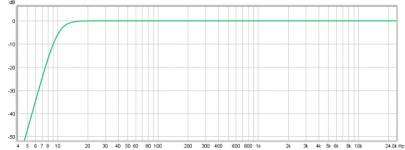
What filter has a frequency response looking like this?
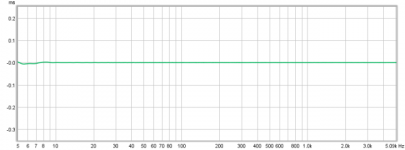
With a group delay response like this?
I'm happy with my DSP results. Applied to my loudspeakers GD make me even happier. Ability to match stereo speakers phase responses to within 2 degrees across entire bandwidth leads to much better imaging.
Funny, I never had that in class. If I thought it was, I just kept on asking until I Got It.
You mean you guys just accepted Not Getting It?
Sometimes, you just don't know what you don't know, to paraphrase Donald Rumsfield.
Last edited:
"Knock Knock."
"Who's there."
"Hugh."
"Hugh Who."
"Hugh people need to listen to me..." (Sheldon Cooper played by Jim Parsons, series 4 ep. 8 "The Big Bang Theory")
It doesn't take an an engineer to know that the most purest sounding instruments still wind up being discarded for other ones because they aren't engaging or descriptive to the musician's tastes. I can rant about the harpsichord etc. etc. but if nobody cares for it no matter what the masterpiece some may regard it to be, it doesn't move forward - it does not acquire further share in the "market" of artists who are now recording.
(I actually really like the harpsichord, but alas...)
How different from this comparison are the instruments that are made for the playback of composition? A harpsichord is extreme to describe tastes but that which permeates the market is based on... well... our own appetites for music. I'm not advocating for more hand waving (like b0z3) but the consumer wants something they can turn on and be happy with.
Awhile back I bought one of those mobile speakers (pre audio revelation). I thought it was okay. Not to be outdone, a couple years later my fellow outlaw bought one. I've since retired mine... but it demonstrates the behavior. We all ape each other. Fine, use the word pantomime if you want... but how different is that?
People want products that describe their experience in life. Even if the product is imperfect, but it describes their lifestyle and the ivory tower is not consulted. Maybe I'm focusing too much the average person but there it is. I want my friends to pass over the mediocre. I can't teach them to think, but maybe to compare.
You know what people love about going to the warehouse store? (I don't have a membership to any of them, the closest I come is the "Target" brand store)
They pay what they feel is a reasonable price... and get products that are what they think are "vetted" from the lower tier of products.
These aren't usually people who read reviews - they are people who buy impulsively because they are "too busy". Really? Probably not but all the same that's the feeling they have. Decisions based on emotion will never be conquered by a double-dose of rational logic. Magical thinking, (altruism) wins in large groups of people. Just ask R4punzel, Belle, Cindy, 4ri3l and the remainder of the royal next of kin branded by a major corporation.
Do you want to sell to a mass market like that, well I don't know.
But I do know that customers who love a product/company experience return for that same experience again. Mcintosh Apples come to mind.
Superior product execution and positioning to the level of the customer's experience. B33tz didn't become popular because it was amazing, it was because they provided a product experience that others could feel good about.
If the final product experience makes them feel good and lifts them out of their world for just a minute (movies, or making their children happy), or makes their entire life less hum-drum... you've got a winner.
"Who's there."
"Hugh."
"Hugh Who."
"Hugh people need to listen to me..." (Sheldon Cooper played by Jim Parsons, series 4 ep. 8 "The Big Bang Theory")
It doesn't take an an engineer to know that the most purest sounding instruments still wind up being discarded for other ones because they aren't engaging or descriptive to the musician's tastes. I can rant about the harpsichord etc. etc. but if nobody cares for it no matter what the masterpiece some may regard it to be, it doesn't move forward - it does not acquire further share in the "market" of artists who are now recording.
(I actually really like the harpsichord, but alas...)
How different from this comparison are the instruments that are made for the playback of composition? A harpsichord is extreme to describe tastes but that which permeates the market is based on... well... our own appetites for music. I'm not advocating for more hand waving (like b0z3) but the consumer wants something they can turn on and be happy with.
Awhile back I bought one of those mobile speakers (pre audio revelation). I thought it was okay. Not to be outdone, a couple years later my fellow outlaw bought one. I've since retired mine... but it demonstrates the behavior. We all ape each other. Fine, use the word pantomime if you want... but how different is that?
People want products that describe their experience in life. Even if the product is imperfect, but it describes their lifestyle and the ivory tower is not consulted. Maybe I'm focusing too much the average person but there it is. I want my friends to pass over the mediocre. I can't teach them to think, but maybe to compare.
You know what people love about going to the warehouse store? (I don't have a membership to any of them, the closest I come is the "Target" brand store)
They pay what they feel is a reasonable price... and get products that are what they think are "vetted" from the lower tier of products.
These aren't usually people who read reviews - they are people who buy impulsively because they are "too busy". Really? Probably not but all the same that's the feeling they have. Decisions based on emotion will never be conquered by a double-dose of rational logic. Magical thinking, (altruism) wins in large groups of people. Just ask R4punzel, Belle, Cindy, 4ri3l and the remainder of the royal next of kin branded by a major corporation.
Do you want to sell to a mass market like that, well I don't know.
But I do know that customers who love a product/company experience return for that same experience again. Mcintosh Apples come to mind.
Superior product execution and positioning to the level of the customer's experience. B33tz didn't become popular because it was amazing, it was because they provided a product experience that others could feel good about.
If the final product experience makes them feel good and lifts them out of their world for just a minute (movies, or making their children happy), or makes their entire life less hum-drum... you've got a winner.
Last edited:
- Status
- Not open for further replies.
- Home
- Member Areas
- The Lounge
- John Curl's Blowtorch preamplifier part II
